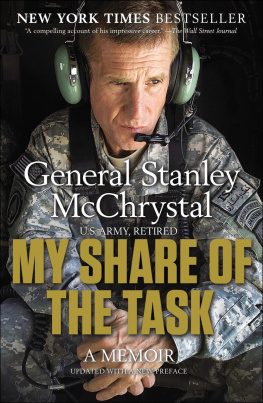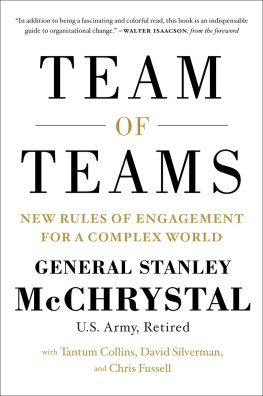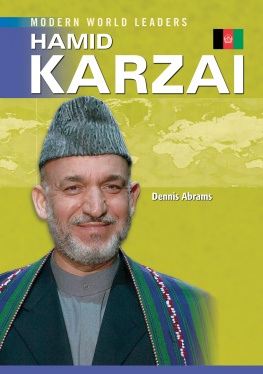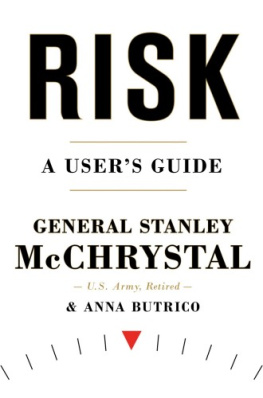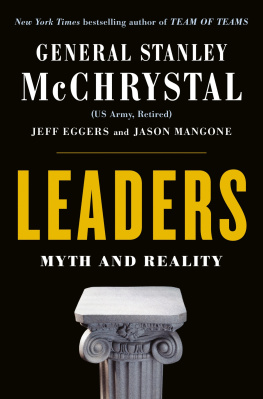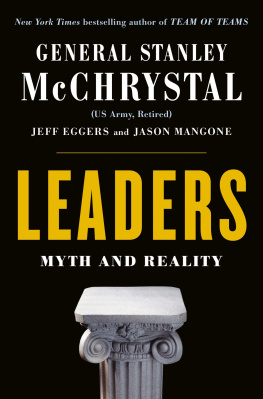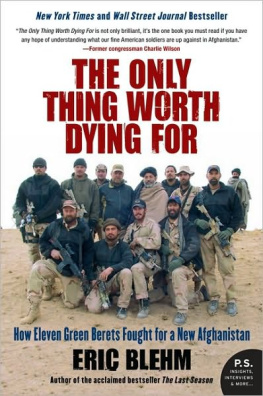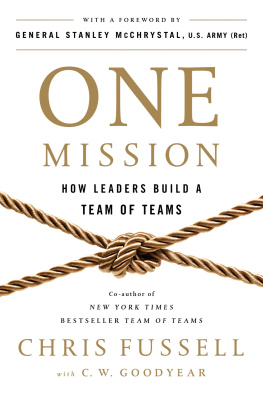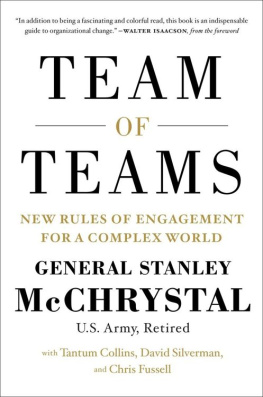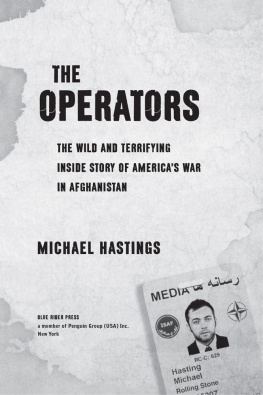Praise for My Share of the Task
General McChrystal is a legendary warrior with a fine eye for enduring lessons about leadership, courage, and consequence. He took me inside the command bunker, on nighttime raids, and through the fog of war, political and military. My Share of the Task is an important, riveting, and instructive account of the triumphs and trials of Americas two longest wars.
Tom Brokaw, author of The Greatest Generation
Written in the tradition of Ulysses S. Grant, My Share of the Task is a clear, compelling, self-critical, and utterly unpretentious memoir. I know of no better book on the nature of modern military command.
John Lewis Gaddis, author of George F. Kennan: An American Life
Stanley McChrystal has written the finest military memoir of his generation. Lucid, thoughtful, and steeped in military and strategic history, My Share of the Task is not just the story of one mans service; it is the story of the development of a new way of war. What Grants memoirs did for war in the age of railroads and the industrial revolution, McChrystals does for armed conflict in our age of information, high tech, and nonstate actors. This book is not just for aficionados of military history or for students of American foreign policy; its for anyone who wants to understand the challenges of leadership in America today.
Walter Russell Mead, author of Special Providence and God and Gold
A remarkable memoir by one of the most exceptional and thoughtful leaders of his generation.
Rory Stewart, author of The Places in Between
PORTFOLIO / PENGUIN
MY SHARE OF THE TASK
Stanley McChrystal retired in July 2010 as a four-star general in the U.S. Army. His last assignment was as the commander of the International Security Assistance Force and as the commander of U.S. forces in Afghanistan. He had previously served as the director of the Joint Staff and as the commander of the Joint Special Operations Command. He is currently a senior fellow at Yale Universitys Jackson Institute for Global Affairs and the cofounder of the McChrystal Group, a leadership consulting firm. He and his wife of thirty-six years, Annie, live in Virginia.
Preface to the Paperback Edition
A ll wars are different. And every soldiers experience is unique. Or so we each believe.
But when I left the Army in the summer of 2010, more than thirty-eight years after Id entered West Point, it was clear Id been a part of something special. The roles and the experiences Id had were different than those Id expected. And the people Id met, those Id served with, and even those Id fought bitterly against shaped what I didand who I wasin surprising, even curious, ways.
Earlier in my life Id thought that at some point I might write about leadership, because it has always fascinated me, but had never considered writing about my own. For that reasonand for many othersId kept no journal, notes, or files. My wife, Annie, produced boxes of my letters shed kept from separations early in my career, but when I decided to write my own story I began with little beyond what was in my head and in my heart.
What Id learned during my serviceand what I felt about it allwasnt immediately clear to me. I was proud of what wed done and knew that the experience of my career, particularly the final decade in Iraq and Afghanistan, had transformed me. But it was only after the laborious two-and-a-half-year process of researching, writing, editing, and reediting; months of media interviews and book talks; and ultimately reading and hearing the judgments of readers, reviewers, and comrades that it has all begun to come into real focus. And I suspect that process will continue.
To some, My Share of the Task will be a war story. After the first section in which I recount my formative early career, I seek to provide a detailed, often gritty account of the fight against Al Qaeda in Iraq and of our effort to recover a faltering effort in Afghanistan. You are taken into the shadows of wars marked by their brutality and vexing complexity, and introduced to actual protagonists too often viewed as one-dimensional stereotypes. Yet they are real and all-too human.
At its heart, however, is a story of change. It tells of how Americas most elite special operations command, carefully constructed from the ashes of failure in the Iranian desert in 1980 into a force of stunning competence, had to transform itself in the midst of combat to avoid defeat. And it shows how I, after being molded by twenty-five years of military leadership, came face-to-face with a terrorist network whose ruthless leader leveraged tactics, technology, religion, and emotion to effectively change the rules of the game. Zarqawis challenge demanded that I change how I thought and how I led.
Change is disruptive and frightening. People and organizations develop habits and cultures based upon what has worked in the past. They cope with the environment around them and deal with challenges that over time can become familiar. They grow confident in proven solutions. What worked before becomes the default response. Seniority and experience start to become synonymous with wisdom. Process guarantees predictable competenceand it is comfortable.
As organizations grow this phenomenon is magnified. There seems to be safety in size, wealth, or technological superiority. Mass compensates for the loss of speed and agility. People judge little problems less as problems and more as small distractions. Big is reassuring. Even potentially mortal threats seem less daunting. Rome fell, to be sure, but it took quite a long time. Such thoughts are comforting to all but those around when things finally come crashing down.
I found that this was exactly what had happened to the special operations command when I took charge of it in 2003. We were great at what we didindeed, unequalledbut we werent right for what needed to be done. We were losing to a side that lacked our resources and professionalism. But no one outside the force would dare tell us to change; it had to come from within.
Most of us knew that real magic resided in small teams: the basketball team, the assault team, or even the small group of roommates creating a start-up. From our own experience we knew that in small teams communication flowed effortlessly and we seemed to think and act as one. When part of such a team, we could analyze a situation, decide, and act as though it was a single, uninterrupted motion, like catching and throwing a baseball. Even a complicated double play required no meetings, e-mails, or orders. We instinctively knew what to door it least thats how it felt.
The challenge, then, was to retain our inherent strengths of competence and precision, yet regain the innovation, adaptability, and focus of a small team. Unexpectedly, I found that the very tools that held the potential for our success were initially limiting our effectiveness by hampering the ability of small teams to act. Our ability to instantaneously communicate, to command and control our forces, and to collect an inexhaustible volume of intelligence was being applied to legacy processes that pulled information to the top and tended to centralize and slow decision making.
The counterintuitive solution came slowly, and the tuition for our education was paid in blood. We had to simultaneously leverage our ability to create a peerless network across which critical information could flow while using that shared consciousness of the environment and our enemy to unlock the magic that lay in the many teams across the command. We inverted a structure and processes designed to inform the commander who would then direct teams what to do, and reshaped them to instead inform the teams and thus empower them to decide without top-down direction. In time, I found that these teams no longer needed to be told what to do; they already knew.
Next page
